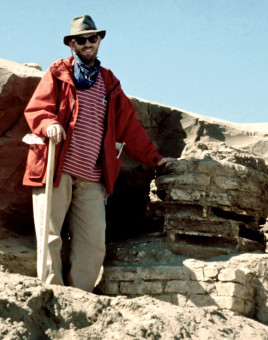
Joel Sweek studies the history and religions of the ancient Near East and Mediterranean, with an emphasis on philology and archaeology. After taking a BA in English Language and Literature, he changed his focus to the ancient Near East and Classical Mediterranean, taking an MA and a PhD, for which he wrote a dissertation on dream divination in third–first millennium B.C. Sumerian, Akkadian, Hebrew, and Aramaic texts. In the classroom, he has taught courses in Biblical Hebrew, topics in the History of Religions, Hebrew Bible, Second-Temple Judaism, Early Christian Literature, Philosophy of Religion, and the History of Christianity.
Specialty
History and Religions of the Ancient Near East and Mediterranean world.Academic Credentials
BA 1982, , MA, 1987, PhD, 1996, University of Chicago
Teaching
Lewis & Clark College, 2003-2009, 2011 – present.
Willamette University. Spring 2004.
Reed College. 1997–1998.
Georgetown University. 1996–2003.
Beloit College. Fall 1995.
University of Chicago. Spring 1991–1993, 1995–1996.
Loyola University, Chicago. 1989–1990.
Research
Publications
Biology of Religion. Method & Theory in the Study of Religion 14 (2002), 196–218.
Inquiring for the State in the Ancient Near East: Delineating Political Location. In Magic and Divination in the Ancient World. Ancient Magic and Divination II. Ed. Leda Ciraolo and Jonathan Seidel, 41–56. Leiden: Brill, 2002.
In a New Age of Theory: Toolkit or Toy Box?, Symposium: Secular Theories on Religion: Current Perspectives, ed. Tim Jensen and Mikael Rothstein (2001). Bulletin for the Council of Societies for the Study of Religion 31 (2002), 27–28.
The Monuments, the Babel-Bibel Streit, and Responses to Historical Criticism. In The Pitcher is Broken: Essays in Honor of Gösta W. Ahlström. JSOTSup 152. Ed. Steven Holloway and Lowell Handy, 401–419. Sheffield: JSOT Press, 1995.
Books Reviewed
A Culture of Conspiracy: Apocalyptic Visions in Contemporary America, by Michael Barkun (2003). The Journal of Religion 86/4 (2006), 691–692.
A Letter That Has Not Been Read: Dreams in the Hebrew Bible, by Shaul Bar (2001). Journal of Near Eastern Studies 64/2 (2005), 137–139.
Democracy’s Ancient Ancestors: Mari and Early Collective Governance, by Daniel E. Fleming (2004). Review of Biblical Literature (Fall 2004).
Contesting Sacrifice: Religion, Nationalism, and Social Thought in France, by Ivan Strenski (2002). The Journal of Religion 83/3 (2003), 514–515.
The Lure of the Edge: Scientific Passions, Religious Beliefs, and the Pursuit of UFOs, by Brenda Denzler (2001). History of Religions 43 (2003), 62–66.
Hume’s Abject Failure: The Argument Against Miracles, by John Earman (2000). The Journal of Religion 82 (2002), 302–303.
Kings and Prophets: Monarchic Power, Inspired Leadership, and Sacred Text in Biblical Narrative, by Christiano Gottanelli (1999). The Journal of Religion 80 (2000), 664–665.
Divination in Ancient Israel and its Near Eastern Environment, by Frederick H. Cryer (1994). Journal for Biblical Literature 116 (1997), 725–727.
The Oneirocriticon of Achmet, by Steven M. Oberhelman (1991). Chaucer Yearbook: A Journal for Late Medieval Studies 2 (1995): 155–159.
Professional Experience
Co-Coordinator, Lewis & Clark College Study Abroad Program in Glasgow, Scotland, Fall 2008.
Excavator, Haçinebi Tepe, Turkey. Director, Professor Gil Stein, Anthropology Department, Northwestern University. Summer 1995.
Excavator, Nippur. Iraq. Director, Professor McGuire Gibson, The Oriental Institute, The University of Chicago. Winter 1990.
Words and Numbers is located in room 404 of Miller Center on the Undergraduate Campus.
MSC: 83
email GenEd@lclark.edu
voice 503-768-7208
Director: Kundai Chirindo
Admin: Dawn Wilson
Words and Numbers
Lewis & Clark
615 S. Palatine Hill Road MSC 83
Portland OR 97219